#i think certain discourse took off during the last hiatus tbh
Explore tagged Tumblr posts
Note
Idk if uve discussed this before, im new haha but I really enjoy your readings of the show and I’m curious, would u call louis a femme? Idk i think it’s a widely accepted canon in the fandom and i constantly see it spread all over twitter with no argument whatsoever and im over here like i.. i dont see it?? Idk!
Hey! Welcome, anon! And thank you for your kind words! You’re very sweet!
I think I’ve probably discussed it in fragments before, but not outright said it, but no, I wouldn’t call Louis a femme. It’s certainly a largely accepted fanon in a vocal part of the fandom, particularly on Twitter and ao3, and yeah - - I mean. I’m really glad people are having fun with it! I do also sometimes feel they’re watching a different show to me though, because it’s honestly not something I see at all. I don’t know if their arguments are necessarily organized in the one place (although I could be very wrong in terms of that!) but I might use this as an opportunity to collate my thoughts and the previous posts I’ve made addressing the arguments around this particular topic. SO! Okay! Let’s break it down and dive in:
Louis is femme because he’s a Gothic Heroine
I just don’t agree with this argument, I’m sorry. I’m not going to get into the weeds of this one, just because I feel like I’ve done so already, but I don’t personally read Louis as a gothic heroine at all. In fact, I see him as a very archetypical Byronic Hero, which I talked about in this post, and in others in my Byronic Hero tag.
Louis is femme because he is a Battered Housewife / relying on a Sugar Daddy
This point often gets tied up into the gothic heroine one, and it’s one that always kind of surprises me a little bit. Even putting aside the fact that it’s an ugly, misogynistic trope in general, Louis’ relationship to being a quote-unquote ‘housewife’ is one that – to me – is symbolic of his feelings of emasculation in the Rue Royale household not as a result of Lestat alone, but as a result of the white power structures in New Orleans that would disempower and disenfranchise him. He doesn’t like it, it doesn’t make him ‘femme’, in fact, my interpretation is the opposite – it emasculates him as a Black Man, and he feels that in every part of his life to the point that both his daughter and sister weaponize it against him, and I personally think it’s a factor in his periodic impotence in his marriage. Respectively, Claudia calls him the housewife, and Grace calls Lestat his white daddy – these aren’t compliments, these are callous insults from both of them designed to bruise his pride and force him into action. The fact that neither of them work to move him the way they want doesn’t mean Louis identifies with them, rather it means he’s – at the time – committed to Lestat for better and worse, but their words compound in a way that fuels his resentment of Lestat as both an adulterous husband and a symbol of everything wrong with his life.
Further to that – and I say it in the Byronic Hero/Gothic Heroine post that I link to above – but a vital part of power dynamic tropes in gothic literature is that women lose power through marriage, they don’t gain it, and Louis does, in fact, gain it. Lestat’s a ticket to social advancement for Louis because as much as Louis (rightfully! It’s extremely racist!) hates being forced into a servitude role publicly at the theatre or in lease agreements, it’s Lestat’s whiteness that allows Louis into more conversations politically, and eventually allows him to buy the Fair Play Saloon and turn it into The Azaelia. It’s a limited power, of course, as a result of his race and the era, but the show actually explicitly lays out certain things for us like the fact that Louis pays Lestat back in full, and pointedly, that Louis never felt that he had to pay Lestat back at all:
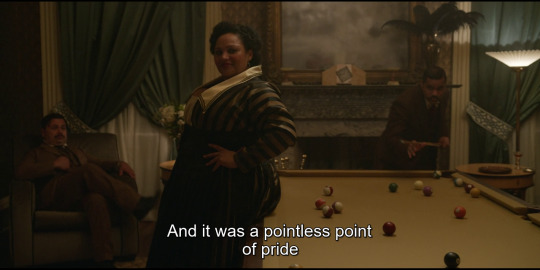
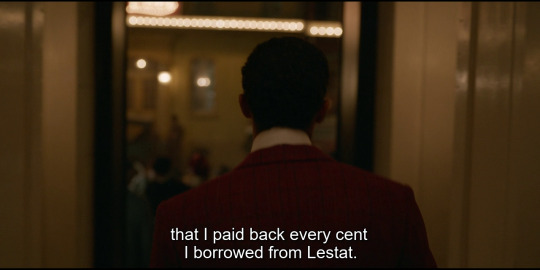
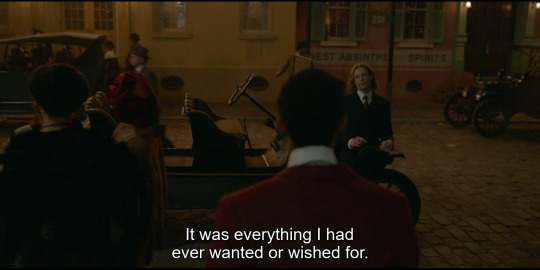
The last line of which is Louis greeting Lestat not as a sugar baby or a housewife walking out to his sugar daddy or husband, but as a business man to his husband.
In fact, the interesting exchange of power in that sequence actually leans to the reverse as Lestat ends up playing host to a new client while Louis lords over an empire.
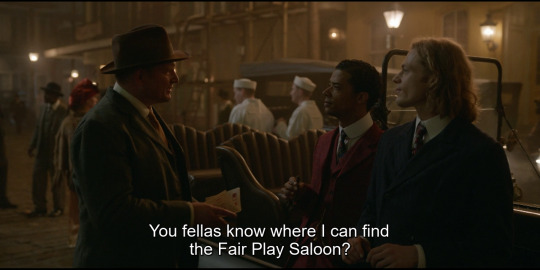
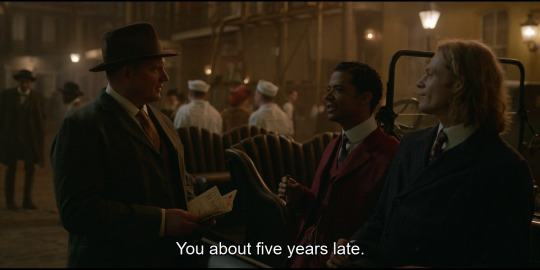
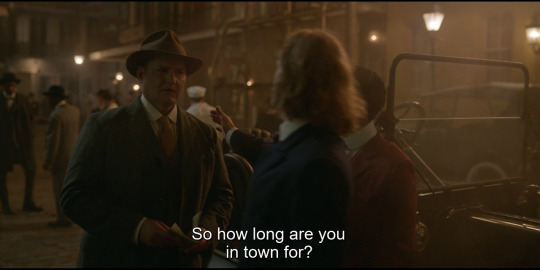
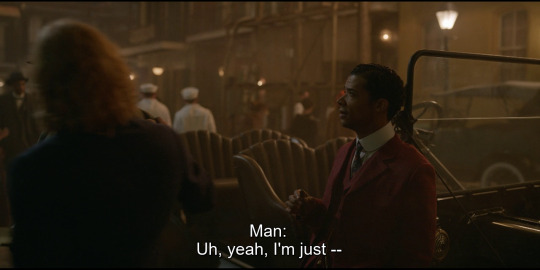
(You can't see it exactly in these subtitles, but it's Louis who says 'you about five years late', and Lestat honeytrapping with taking the man away).
It's a dynamic that repeats with the musician who tries to leave that Lestat coerces into staying - Louis' king of the castle, and Lestat, the show implies, I feel, plays the placating partner smooting over the edges.
But isn’t Lestat a symbol of patriarchal power in the Rue Royale Household?
I’ve had a couple of asks about this and have a long reply in my drafts that I’ll try and post this weekend, but yes and no? I think in Rue Royale, Lestat’s definitely a symbol of patriarchal power to Claudia, and I think Louis sometimes feels him that way too, but I don’t think it’s actually true for Louis in the way that it is for Claudia. Gender isn’t what divides Louis and Lestat, it’s race, and every time Louis has the chance to exert patriarchal power against anyone outside that house or inside it, he uses it – from coercing Lestat into Claudia's rebirth to physically assaulting Claudia over Lestat’s murder, to even trying to influence her diet and guilting her into staying, to throwing Lestat out of his own house and then fucking him in his lover’s bed (which, obviously, are after Lestat's singular act of violence), to being literally a pimp, strongarming his sister and his mother, to giving less than 0 fucks about Lily’s murder and the attempted anal-rape of Bricktop - - just.
Yeah. There are two patriarchs in the Rue Royale household, and both their names begin with L.
Eldest daughter syndrome
Sometimes men are also eldest siblings who feel the burden of responsibility?
Even beyond that though, I think Louis’ response to Grace is particularly paternalistic, a pattern he’d repeat with Claudia, which I talk about here. I do think Louis has a lot of responsibility and weight on his shoulders as an eldest child, absolutely, and I actually think there’s a lot to talk about in terms of his complex position as brother-father to Paul and Grace in s1 (and I empathise with him intensely in this regard as someone who’s been a sibling’s guardian), but like. That’s not a feminine trait, nor is it one that makes him an eldest daughter. I’m not one, and he’s not one either. Sibling dynamics aren’t cut and paste.
But Louis buys and reads Madame Bovary and obviously relates to Emma
I mean, he doesn’t buy it – the show literally, explicitly makes the point of telling us that it’s Lestat’s copy of the book that he’s reading, which honestly makes sense to me. I talked about it here (where I include the caps of it being Lestat's book too), but Emma as a character cheats because she finds monogamy boring, provincial life even more so and dislikes her daughter, while married to a successful man in a regional town. Louis’ not the Emma in that equation, Lestat is, given he's fucking Antoinette – allegedly because he wants variety – escaped the Auvergne in Paris, and can’t cope with parenthood and/or Claudia.
Interestingly too, Louis’ focus in that scene is on the 'denseness' of the prose and 'the absence of metaphor' not the content, as he ignores Lestat having a meltdown directly opposite him. My interpretation of that scene is that the writing is pointing out exactly how disconnected they are from each other, and that Louis can read a story that parallels a lot of Lestat’s experience, and fail to relate it to, or empathise with Lestat at all, even as Lestat indulges Louis’ depression and hoarding, which ! I love Louis, but Lestat does in that sequence (not that that justifies anything that Lestat does, of course).
Isn’t Louis compared to Juliet and Mélisande?
Mmm, yes and no? Armand does put him in the Juliet role, which Louis riffs with Dreamstat about, but I tend to interpret that more to be about the involvement of the balcony than I do about their roles as Romeo and Juliet – because, y’know. Not everything’s actually about gender, particularly with same sex couples of that era who had limited reference points generally, and certainly limited mainstream ones.
And Melisande - - not at all, actually? I do have to say that I’m a little bit baffled by this particular argument given we have the lyrics to Come to Me and Lestat puts himself in the feminine role of Mélisande (and I actually do think you can mount the argument that he's done that because he’s intending for Antoinette to sing it, which I thought for a long time before hearing Long Face tbh, and now I actually do think it’s deliberately playing into Louis’ sense of masculinity), and he does cast Louis in the masculine role of Pelléas. The chorus literally goes:
Ruin each other Like star-crossed lovers Your Pelléas, my Mélisande Oh, come to me Come to me
So, yeah. Again, that argument just doesn't quite land for me.
Wasn’t he jealous of Grace’s pregnancy though?
Was he? That wasn’t my interpretation, but I’d actually genuinely be interested to hear a case for it, because I feel that’s kind of tasty on a narrative level, haha. My interpretation of that entire sequence though kind of feeds back into that eldest sibling thing again where he a) resented Grace building something of her own before he could, and b) was terrified of the idea that her having her own family would mean that she’d pull way from him which she, of course, did.
I tend to see Louis’ desire to have Claudia as a fairly impulsive one, and I actually see (in the show’verse) his desire to have Lestat be the one to turn her as a part of him further interlocking him and Lestat together, particularly after he's effectively just broken up with Lestat. It's messy! But yeah, I mean, I think 2.07 laid out pretty cleanly that Louis' choice to turn Claudia was inherently a selfish one, and I personally don't see it as one borne out of jealousy so much as needing an anchor.
Anne bases Louis on herself
She also bases Lestat on herself and/or everything she wants to be, and also washes her hands of Louis as a character for books at a time, and like - - I’m sorry, this is not the tone I usually take, but like - - lowkey, who cares? Everyone in this fandom loves death of the author until Anne says one thing they can use to justify their headcanons, and I just don’t really get it. Why are you trying to interpret a vampire novel as a memoir? Obviously it’s not factual? Anne’s not a man, she’s not drinking blood, she’s not romantically entangled with her dead daughter, like I do understand that it can feel noodly sometimes with authors and characters, but as someone who works with a lot of writers, I can promise you they’re dipping in and out of characters like crazy, haha.
It doesn’t mean a character’s them, and it certainly doesn’t mean you’re interacting with Anne when you're interacting with Louis, which I suspect a lot of people don’t want anyway? I don't know, personally I view this one as a bit of a non-starter.
Louis’ pretty though
Yeah, he is! He’s your Helen of Troy! He’s beautiful! He’d look amazing in tights and heels! That doesn’t mean he’s canonically femme though.
#louis asks#iwtv asks#maybe there's more arguments?#i feel these are the ones i see the most though#but yeah anon i mean mmm#i think certain discourse took off during the last hiatus tbh#because i was around on the periphery last season and i feel like i came back at the start of s2 to a very different social media climate#so i guess take that as you will#it's interesting though#all in all#me like#will I use a main tag?#y’know what?#yeah maybe#haha#amc interview with the vampire
144 notes
·
View notes
Note
Please this is amazing and everyone should listen up!
Idk if uve discussed this before, im new haha but I really enjoy your readings of the show and I’m curious, would u call louis a femme? Idk i think it’s a widely accepted canon in the fandom and i constantly see it spread all over twitter with no argument whatsoever and im over here like i.. i dont see it?? Idk!
Hey! Welcome, anon! And thank you for your kind words! You’re very sweet!
I think I’ve probably discussed it in fragments before, but not outright said it, but no, I wouldn’t call Louis a femme. It’s certainly a largely accepted fanon in a vocal part of the fandom, particularly on Twitter and ao3, and yeah - - I mean. I’m really glad people are having fun with it! I do also sometimes feel they’re watching a different show to me though, because it’s honestly not something I see at all. I don’t know if their arguments are necessarily organized in the one place (although I could be very wrong in terms of that!) but I might use this as an opportunity to collate my thoughts and the previous posts I’ve made addressing the arguments around this particular topic. SO! Okay! Let’s break it down and dive in:
Louis is femme because he’s a Gothic Heroine
I just don’t agree with this argument, I’m sorry. I’m not going to get into the weeds of this one, just because I feel like I’ve done so already, but I don’t personally read Louis as a gothic heroine at all. In fact, I see him as a very archetypical Byronic Hero, which I talked about in this post, and in others in my Byronic Hero tag.
Louis is femme because he is a Battered Housewife / relying on a Sugar Daddy
This point often gets tied up into the gothic heroine one, and it’s one that always kind of surprises me a little bit. Even putting aside the fact that it’s an ugly, misogynistic trope in general, Louis’ relationship to being a quote-unquote ‘housewife’ is one that – to me – is symbolic of his feelings of emasculation in the Rue Royale household not as a result of Lestat alone, but as a result of the white power structures in New Orleans that would disempower and disenfranchise him. He doesn’t like it, it doesn’t make him ‘femme’, in fact, my interpretation is the opposite – it emasculates him as a Black Man, and he feels that in every part of his life to the point that both his daughter and sister weaponize it against him, and I personally think it’s a factor in his periodic impotence in his marriage. Respectively, Claudia calls him the housewife, and Grace calls Lestat his white daddy – these aren’t compliments, these are callous insults from both of them designed to bruise his pride and force him into action. The fact that neither of them work to move him the way they want doesn’t mean Louis identifies with them, rather it means he’s – at the time – committed to Lestat for better and worse, but their words compound in a way that fuels his resentment of Lestat as both an adulterous husband and a symbol of everything wrong with his life.
Further to that – and I say it in the Byronic Hero/Gothic Heroine post that I link to above – but a vital part of power dynamic tropes in gothic literature is that women lose power through marriage, they don’t gain it, and Louis does, in fact, gain it. Lestat’s a ticket to social advancement for Louis because as much as Louis (rightfully! It’s extremely racist!) hates being forced into a servitude role publicly at the theatre or in lease agreements, it’s Lestat’s whiteness that allows Louis into more conversations politically, and eventually allows him to buy the Fair Play Saloon and turn it into The Azaelia. It’s a limited power, of course, as a result of his race and the era, but the show actually explicitly lays out certain things for us like the fact that Louis pays Lestat back in full, and pointedly, that Louis never felt that he had to pay Lestat back at all:



The last line of which is Louis greeting Lestat not as a sugar baby or a housewife walking out to his sugar daddy or husband, but as a business man to his husband.
In fact, the interesting exchange of power in that sequence actually leans to the reverse as Lestat ends up playing host to a new client while Louis lords over an empire.




(You can't see it exactly in these subtitles, but it's Louis who says 'you about five years late', and Lestat honeytrapping with taking the man away).
It's a dynamic that repeats with the musician who tries to leave that Lestat coerces into staying - Louis' king of the castle, and Lestat, the show implies, I feel, plays the placating partner smooting over the edges.
But isn’t Lestat a symbol of patriarchal power in the Rue Royale Household?
I’ve had a couple of asks about this and have a long reply in my drafts that I’ll try and post this weekend, but yes and no? I think in Rue Royale, Lestat’s definitely a symbol of patriarchal power to Claudia, and I think Louis sometimes feels him that way too, but I don’t think it’s actually true for Louis in the way that it is for Claudia. Gender isn’t what divides Louis and Lestat, it’s race, and every time Louis has the chance to exert patriarchal power against anyone outside that house or inside it, he uses it – from coercing Lestat into Claudia's rebirth to physically assaulting Claudia over Lestat’s murder, to even trying to influence her diet and guilting her into staying, to throwing Lestat out of his own house and then fucking him in his lover’s bed (which, obviously, are after Lestat's singular act of violence), to being literally a pimp, strongarming his sister and his mother, to giving less than 0 fucks about Lily’s murder and the attempted anal-rape of Bricktop - - just.
Yeah. There are two patriarchs in the Rue Royale household, and both their names begin with L.
Eldest daughter syndrome
Sometimes men are also eldest siblings who feel the burden of responsibility?
Even beyond that though, I think Louis’ response to Grace is particularly paternalistic, a pattern he’d repeat with Claudia, which I talk about here. I do think Louis has a lot of responsibility and weight on his shoulders as an eldest child, absolutely, and I actually think there’s a lot to talk about in terms of his complex position as brother-father to Paul and Grace in s1 (and I empathise with him intensely in this regard as someone who’s been a sibling’s guardian), but like. That’s not a feminine trait, nor is it one that makes him an eldest daughter. I’m not one, and he’s not one either. Sibling dynamics aren’t cut and paste.
But Louis buys and reads Madame Bovary and obviously relates to Emma
I mean, he doesn’t buy it – the show literally, explicitly makes the point of telling us that it’s Lestat’s copy of the book that he’s reading, which honestly makes sense to me. I talked about it here (where I include the caps of it being Lestat's book too), but Emma as a character cheats because she finds monogamy boring, provincial life even more so and dislikes her daughter, while married to a successful man in a regional town. Louis’ not the Emma in that equation, Lestat is, given he's fucking Antoinette – allegedly because he wants variety – escaped the Auvergne in Paris, and can’t cope with parenthood and/or Claudia.
Interestingly too, Louis’ focus in that scene is on the 'denseness' of the prose and 'the absence of metaphor' not the content, as he ignores Lestat having a meltdown directly opposite him. My interpretation of that scene is that the writing is pointing out exactly how disconnected they are from each other, and that Louis can read a story that parallels a lot of Lestat’s experience, and fail to relate it to, or empathise with Lestat at all, even as Lestat indulges Louis’ depression and hoarding, which ! I love Louis, but Lestat does in that sequence (not that that justifies anything that Lestat does, of course).
Isn’t Louis compared to Juliet and Mélisande?
Mmm, yes and no? Armand does put him in the Juliet role, which Louis riffs with Dreamstat about, but I tend to interpret that more to be about the involvement of the balcony than I do about their roles as Romeo and Juliet – because, y’know. Not everything’s actually about gender, particularly with same sex couples of that era who had limited reference points generally, and certainly limited mainstream ones.
And Melisande - - not at all, actually? I do have to say that I’m a little bit baffled by this particular argument given we have the lyrics to Come to Me and Lestat puts himself in the feminine role of Mélisande (and I actually do think you can mount the argument that he's done that because he’s intending for Antoinette to sing it, which I thought for a long time before hearing Long Face tbh, and now I actually do think it’s deliberately playing into Louis’ sense of masculinity), and he does cast Louis in the masculine role of Pelléas. The chorus literally goes:
Ruin each other Like star-crossed lovers Your Pelléas, my Mélisande Oh, come to me Come to me
So, yeah. Again, that argument just doesn't quite land for me.
Wasn’t he jealous of Grace’s pregnancy though?
Was he? That wasn’t my interpretation, but I’d actually genuinely be interested to hear a case for it, because I feel that’s kind of tasty on a narrative level, haha. My interpretation of that entire sequence though kind of feeds back into that eldest sibling thing again where he a) resented Grace building something of her own before he could, and b) was terrified of the idea that her having her own family would mean that she’d pull way from him which she, of course, did.
I tend to see Louis’ desire to have Claudia as a fairly impulsive one, and I actually see (in the show’verse) his desire to have Lestat be the one to turn her as a part of him further interlocking him and Lestat together, particularly after he's effectively just broken up with Lestat. It's messy! But yeah, I mean, I think 2.07 laid out pretty cleanly that Louis' choice to turn Claudia was inherently a selfish one, and I personally don't see it as one borne out of jealousy so much as needing an anchor.
Anne bases Louis on herself
She also bases Lestat on herself and/or everything she wants to be, and also washes her hands of Louis as a character for books at a time, and like - - I’m sorry, this is not the tone I usually take, but like - - lowkey, who cares? Everyone in this fandom loves death of the author until Anne says one thing they can use to justify their headcanons, and I just don’t really get it. Why are you trying to interpret a vampire novel as a memoir? Obviously it’s not factual? Anne’s not a man, she’s not drinking blood, she’s not romantically entangled with her dead daughter, like I do understand that it can feel noodly sometimes with authors and characters, but as someone who works with a lot of writers, I can promise you they’re dipping in and out of characters like crazy, haha.
It doesn’t mean a character’s them, and it certainly doesn’t mean you’re interacting with Anne when you're interacting with Louis, which I suspect a lot of people don’t want anyway? I don't know, personally I view this one as a bit of a non-starter.
Louis’ pretty though
Yeah, he is! He’s your Helen of Troy! He’s beautiful! He’d look amazing in tights and heels! That doesn’t mean he’s canonically femme though.
#louis asks#iwtv asks#maybe there's more arguments?#i feel these are the ones i see the most though#i think certain discourse took off during the last hiatus tbh
144 notes
·
View notes